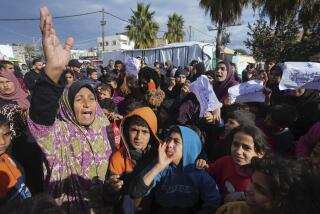Iraqi officials deny coup bid after 24 officers held
The arrests of up to 24 police and Defense Ministry officials accused of aiding terrorists and belonging to the banned Baath Party of Saddam Hussein prompted vigorous denials Thursday by Shiite government leaders of a coup attempt against them.
News of the arrests, which also raised concerns that the government’s crackdown was reminiscent of Hussein’s regime, comes just two weeks before Iraq is scheduled to take over responsibility for its security from the U.S. A bilateral agreement calls for all U.S. combat troops to leave Iraqi urban areas by June 30 and the country by the end of 2011.
Western officials have described Prime Minister Nouri Maliki as deeply suspicious that Iraqi security officers could attempt a coup.
“The operation was based on information about some officers facilitating terrorist activities and helping outlaws and the remnants of the vanquished [Baath Party] regime,” said Maj. Gen. Qasim Atta, a military spokesman.
Interior Ministry officials initially said as many as 35 police officers had been jailed, including six generals. Later, an Iraqi army general said in a statement that 24 suspects had been detained, including some Defense Ministry officers.
Interior Ministry spokesman Maj. Gen. Abdul Kareem Khalaf said his ministry’s internal affairs directorate had arrested 23 policemen. They were thought to belong to the Baath Party’s Al Awda, or Return, branch, which has been accused of committing attacks in Baghdad since 2003. He dismissed reports that the suspects were thought to be planning a coup.
Yassin Majid, an advisor to Maliki, said most of the officers were with the traffic police and were suspected of providing license plates and fake IDs to terrorists and Baath members.
The U.S. Embassy declined to comment on the arrests.
Some non-Shiite Muslim lawmakers said the arrests seemed political in nature and criticized the government.
“This reminds me of the old regime. It’s confusing. First they were saying coup d’etat. . . . It’s not clear what is going on,” said Kurdish lawmaker Mahmoud Othman. “I’m afraid this may have some political ends from the government, maybe from the prime minister.”
Some legislators compared the government’s behavior to that of Hussein’s regime. Hussein’s security apparatus had often rounded up political opponents on dubious charges. The lawmakers raised concern that the arrests were linked to the Shiite-led government’s efforts to consolidate power.
Some Shiite, Sunni Arab and Kurdish lawmakers have accused Maliki recently of harboring authoritarian ambitions, in a break from the power-sharing model championed by U.S. officials since 2003.
Sunni lawmaker Salim Abdullah Jabouri denounced the arrests.
“It wasn’t to intimidate the Sunnis necessarily but rather to frighten the officers in the ministries of Interior and Defense so that they can be controlled and [to] make them anxious,” Jabouri said. “It came suddenly and without any justifications or warnings.”
Iraq’s security apparatus has long been politicized and subject to influence by political parties. A U.S. official in Baghdad warned Wednesday that arrest warrants in Iraq came quite regularly from political pressure.
He described cases where police were jailed by rival units for carrying out arrests.
“It happens often enough. It’s a serious issue. If you arrest someone you may get arrested,” said the official, who declined to be named because of the sensitivity of the issue. “Sometimes you think . . . did this arrest warrant get issued because a Ministry of Interior official knew a judge and the judge is corrupt?”
The official also warned that some of the arrests of U.S.-backed Sunni paramilitary fighters, known as the Sons of Iraq, were politically motivated, noting the deep mutual suspicions between the former insurgents and the Shiite-dominated security forces.
In Kirkuk, Kalweez Dilshad Abdullah, a Kurdish member of the Communist Party, was shot and beheaded in her home.
“We think she was killed because she was a women’s rights activist,” said party spokesman Azad Ghareeb.
--
--
Times staff writers Raheem Salman and Ali Hameed in Baghdad and special correspondent Asso Ahmed in Sulaymaniya, Iraq, contributed to this report.
More to Read
Start your day right
Sign up for Essential California for news, features and recommendations from the L.A. Times and beyond in your inbox six days a week.
You may occasionally receive promotional content from the Los Angeles Times.






